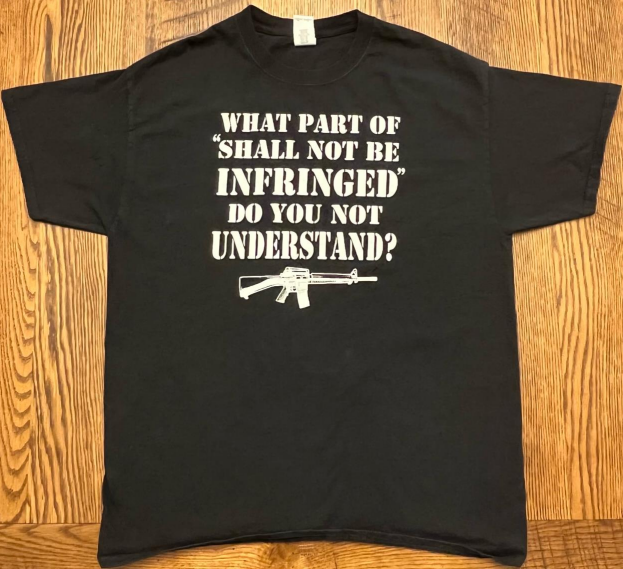An Iowa school suspended a student for wearing a T-shirt depicting a gun. Now she's suing
- Oops!Something went wrong.Please try again later.

Update: Johnston Community School District and the plaintiff agreed to settle this lawsuit in May 2023 for $15,000, according to settlement documents. The district did not admit to any wrongdoing.
A Johnston High School student says she was removed from class and suspended from school for wearing a T-shirt quoting the Second Amendment and depicting a firearm.
According to a suit filed on her behalf Monday in federal court, the suspension came after Johnston High teacher Thomas Griffin led a discussion in August 2022 in his senior government class in which he told the girl and other students that their free speech rights were “extremely limited” on school property, and that as a teacher, he would decide what was acceptable speech in the classroom.
"And with respect to clothing … Griffin told his students that he would not allow students to wear any clothing that depicts guns, alcohol, or any other 'inappropriate material,'" the suit says.
The student, who is identified only as A.B. in the complaint, disagreed. Two days later, she returned to class wearing a T-shirt with the text “What part of ‘shall not be infringed’ do you not understand?” and a drawing of an assault-style rifle. According to the complaint, the student and her brother had both worn the shirt to school before without challenge, but this time was different.
Griffin allegedly told her the shirt violated the school dress code and sent her to the office. When she refused to change her shirt, administrators suspended her, the suit says.
It says one assistant principal told her the picture of a gun could be perceived as threatening, and even though nobody but Griffin had objected to the shirt, "we don't get to choose how our words or actions make people feel."
Complaint: District apologized, but not teacher
The suit is reminiscent of another central Iowa case decided by the U.S. Supreme Court in 1969 after students in Des Moines were suspended for wearing black armbands to school in protest of the Vietnam War. In Tinker vs. Des Moines, the court famously held that students do not "shed their constitutional rights to freedom of speech or expression at the schoolhouse gate."
After her suspension, according to the complaint, Janet Bristow, the mother of the student in Monday's suit, emailed school board members about the situation. Within hours, district Superintendent Laura Kacer called to apologize, and another administrator, who had previously advised that the shirt violated the school dress code, told her mother that he “now recognize[d] that this is considered political speech.”
From 2021: Supreme Court sides with cheerleader who wrote profane social media post slamming her school
Bristow asked that Griffin also apologize and tell the other students who had seen her daughter ejected that she had been in the right. According to the complaint, Griffin did neither. Nor has the school removed the student's suspension from her permanent school records, the complaint says, leading to her legal action.
The complaint asks the court to declare that "wearing clothing depicting a firearm in a non-threatening, non-violent manner is protected under the First Amendment" and for "compensatory, nominal and punitive damages."
The district has not yet responded in court, and a spokesperson said it has not yet been served with the lawsuit and had no comment. The plaintiffs' attorneys likewise declined to comment beyond the allegations in the complaint.
Teacher has national civics platform
The complaint emphasizes that Griffin, in particular, should be well aware of students' First Amendment rights. The 14-year Johnston teacher also teaches government and history classes as an adjunct professor at several colleges and in 2013 was named a James Madison Fellow, a prestigious award to help secondary educators "becomeoutstanding educators of the U.S. Constitution."
Also, just weeks after removing the student from his class, he was named to the Bill of Rights Institute's National Teacher Council, a body that develops civics resources and curricula for teachers nationwide. In addition, he has written for the institute about free speech challenges related to schools, including on social media. The institute did not return a message Tuesday seeking comment.
"Griffin, who teaches the Bill of Rights, knew that shirt was quoting the Second Amendment of the U.S. Constitution, and he knew it was a commentary on gun control efforts," the complaint says.
Mary Beth Tinker: Some clothing bans OK

The student's lawsuit draws many parallels to Tinker vs. Des Moines, which began in 1965 when lead plaintiff Mary Beth Tinker, then a 13-year-old student at what is now Des Moines' Warren Harding Middle School, was suspended along with other students for wearing black armbands after a school board order not to.
Yet Tinker herself told the Des Moines Register she thinks the Johnston district is likely to win if the lawsuit reaches a judgment on the merits.
Previously: The National School Walkout is planned; here's how Tinker v. Des Moines paved the way
"Under (the Tinker decision), there is ample room for the censorship of messages that impinge on the rights of others, the often-overlooked second part of the Tinker test," Tinker said in an email, pointing to the Supreme Court's holding that "conduct by the student ... which for any reason ... involves substantial disorder or invasion of the rights of others is, of course, not immunized by the constitutional guarantee of freedom of speech."
Tinker said she believes wearing a shirt to school depicting a gun might constitute such an invasion of the rights of others, not just of other students, but of teachers, staff and visitors to the school.
But another expert, Adam Steinbaugh, an attorney for the Foundation for Individual Rights and Expression, said he doubts a court would accept that argument.
Related: 50 years later: Parkland student journalists reflect on Tinker v. Des Moines ruling in Iowa
"The 'invasion of the rights of others' is not the right to be free of words or views that you dislike. It's more a right to be free of harassment or discriminatory conduct or threats," he said. "I understand the image of a gun might sometimes be unsettling to people, but it's far from a threat."
How have other courts ruled?
Courts in at least two other jurisdictions have decided similar cases in favor of the students. In 2020, two Wisconsin students sued their district after being asked to remove shirts depicting firearms. The lawsuit was initially rebuffed: A federal judge dismissed the case, finding that the district's policy banning images of firearms applied equally to pro- and anti-gun rights messages. But an appellate court reversed that decision in 2022, finding that wearing the shirts was a political statement and that the district needs more than "mere speculation" to prove that wearing them will actually disrupt school operations.
Eugene Volokh, a UCLA law professor and First Amendment expert who was involved in the Wisconsin case, pointed to another lawsuit, decided in 2003, against a Virginia school district. The appellate court there "struck down a school’s ban on clothing that depicts firearms, in a very similar context," he said in an email. "I think this lawsuit is likewise likely to prevail."
Steinbaugh said it's notable the new case arises so close to where the Tinker case began — Johnston High School is about an 11-mile drive from Harding Middle School — and so closely echoes the facts of that dispute.
"We're talking about the most famous student free speech cases, one of the most famous Supreme Court cases, that happened a stone's throw away," he said. "Why is it that any school administrator anywhere in the U.S., especially in Des Moines, is not able to apply pretty simple law in a way that is protective of student speech?"
Tinker, now a pediatric nurse and speech activist, said that beyond the free speech question, the dispute should be an opportunity for the district to address controversies about firearms.
"What if the Johnston school district took this as a teaching moment to promote dialogue on gun laws, gun violence statistics, etc.?" she asked. "Iowa trauma nurses who, like me, have cared for so many pediatric victims of gun violence, might take part as well."
William Morris covers courts for the Des Moines Register. He can be contacted at wrmorris2@registermedia.com, 715-573-8166 or on Twitter at @DMRMorris.
This article originally appeared on Des Moines Register: Pro-gun rights T-shirt prompts suspension; Iowa student sues schools

